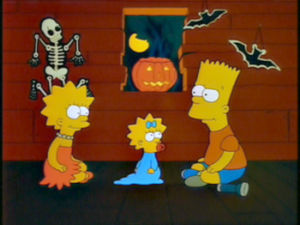
Whether or not you feel that social networking and Web 2.0 applications like Facebook and Twitter have any educational legitimacy or not, teachers are experimenting with using them in their courses.
In some cases, students might welcome their use in a course. The teacher might be seen as innovative. But some students find teachers in these areas to be an intrusion into their private space.
A term being used for the latter reaction is the "creepy treehouse."
Chris Lott might be the person who coined the phrase. Jared Stein offered several definitions of the term on
his blog, Flexnologoy. I don't agree with the ones that talk about "luring kids in" (that's the way
urbandictionary.com also defines it, as in "It's totally creepy treehouse that Professor Jones wants me to be his MySpace friend."). I lean more towards Stein's "Any system or environment that repulses a target user due to it's closeness to or representation of an oppressive or overbearing institution."
I do believe teachers can use these social tools without entering the creepy treehouse. Michael Staton (who founded Inigral, Inc. and is working on a free CMS on Facebook) posted
on his blog about that same sentiment.
...need to debunk the Creepy Treehouse,as it seems to have become some sort of rallying cry and is pulling people in the wrong direction. I'm going to debunk it with contrarian metaphor: the Functioning Mall. (If you come up with something more catchy, let me know.)
First off, let me tell you that the metaphor of the Creepy Treehouse is powerful. There are many different ways you can build a Creepy Treehouse. Instructors crossing lines by getting into personal or social settings where they are not particularly invited is totally creepy treehouse.
However, this in no way suggests that instructors should not be using innovative, even social technologies to engage students. Adults and Teachers and Parents are allowed to and should get on the Social Web, but they must do it carefully and obey the general laws of coexisting with teenagers.I don't think it's the treehouse that is creepy. It's who is inside and what they are doing there. It's not very different from that literal treehouse that some kids built out in the woods near your house.
Reading about all this actually set me to thinking about an older term I was familiar with from animation and is also used in robotics. That term is the "uncanny valley."
From Wikipedia
"The uncanny valley is a hypothesis that when robots and other facsimiles of humans look and act almost like actual humans, it causes a response of revulsion among human observers. The "valley" in question is a dip in a proposed graph of the positivity of human reaction as a function of a robot's lifelikeness. It was introduced by Japanese roboticist Masahiro Mori in 1970, and has been linked to Ernst Jentsch's concept of "the uncanny" identified in a 1906 essay, "On the Psychology of the Uncanny." Jentsch's conception is famously elaborated upon by Sigmund Freud in a 1919 essay, simply entitled "The Uncanny" ("Das Unheimliche"). A similar problem exists in realistic 3D computer animation, such as with the film The Polar Express and Beowulf."
In simpler terms, it's when the animation or robot gets so close to looking real that we start to feel uncomfortable. It's an idea Steven Spielberg touches on in his film
Artificial Intelligence: AI. It's Pinocchio wanting to be a real boy.
When the creepy treehouse is erected in the uncanny valley, there's going to be trouble. Second Life might be such a valley. With all it's fantastical inhabitants, there are also those who want super-realism in both the avatars and the settings. When teachers and schools build their treehouses in Second Life, I think it immediately takes some of the charm/fun/interest out of the place. Who wants to play where the grownups are? When the teacher is using Facebook, it's time to find something new. Maybe...
Probably, some of my feelings on this come from having started teaching in a time when the line between teacher and student was clearly drawn. All my early mentors warned me "not to try to be friends" with my students, and I saw teachers who did cross the line - and it bothered me. But that type of impropriety is not my fear with the new technologies and I don't see these social areas as dangerous in that way.
I have a MySpace account (rarely used) and a Facebook account (checked most days) and a bunch of others that I signed up with so that I could see what was going on there. There are some former students of mine that are my "friends" there, and it's actually nice to keep up with their lives. I'm not surprised when they make me a "limited view" friend. They post things online that they should keep offline. It's interesting to see that when some of them graduate from college, they begin to delete photos, leave groups, delete postings.
Maybe the creepiness increases as the age of the students decreases. I imagine this is more of an issue in the upper levels of K-12 than it is for higher education.
I keep reading that Facebook is developing its own course management system. That's creepy, and I think it just might kill Facebook for students. Without any good statistics and just anecdotal evidence, it seems to me that students want Their Space to be separate from School Space. Like my sons when they were much younger, they want me to stay out of their clubhouse. When mom and dad start hanging out in the clubhouse and redecorating, it's time to find a new place. When parents discover the band you love, their music seems a lot less cool.
 I am an admirer of Albert Einstein. I've written about him and I would have loved to have met him and be able to have a conversation with him. But I don't know how I would feel about talking to a robot version of him.
I am an admirer of Albert Einstein. I've written about him and I would have loved to have met him and be able to have a conversation with him. But I don't know how I would feel about talking to a robot version of him.
 Whether or not you feel that social networking and Web 2.0 applications like Facebook and Twitter have any educational legitimacy or not, teachers are experimenting with using them in their courses.
Whether or not you feel that social networking and Web 2.0 applications like Facebook and Twitter have any educational legitimacy or not, teachers are experimenting with using them in their courses.
